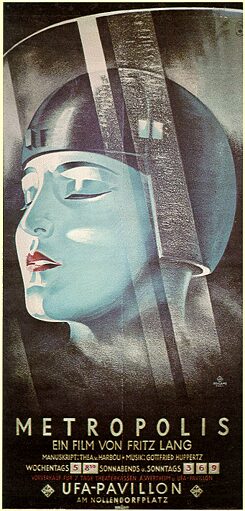Exhibition Early UFA Film Posters: Projecting Women
Eight posters from famous as well as rarely seen or lost Berlin UFA films from the 1920s and 30s portray women as heroines or seductresses, debutantes or harlots. From "Sumurun" to "Metropolis", women are vying for power in male-dominated films.
Presented by the Goethe-Institut
 Metropolis artwork, UFA_Parufamet, Berlin, 1927.
Universum Film AG, founded in 1917 near Berlin, accompanied its film releases in its early decades with elaborate advertising campaigns. Frequently, up to three graphic artworks were commissioned for large productions. In Berlin and Vienna, the two German-language cinema capitals, exclusive movie premiere posters were commissioned by UFA and presented on advertising pillars, walls and billboards weeks before the release.
Metropolis artwork, UFA_Parufamet, Berlin, 1927.
Universum Film AG, founded in 1917 near Berlin, accompanied its film releases in its early decades with elaborate advertising campaigns. Frequently, up to three graphic artworks were commissioned for large productions. In Berlin and Vienna, the two German-language cinema capitals, exclusive movie premiere posters were commissioned by UFA and presented on advertising pillars, walls and billboards weeks before the release.With eight early posters, the Goethe-Institut is showing the range of the image of women of that time, embodied by actresses such as Pola Negri, Brigitte Helm and Sybille Schmitz. The posters also illustrate some films by later Hollywood directors: Ernst Lubitsch is represented with "Sumurun", Fritz Lang with "The Nibelungs" and "Metropolis". In addition to advertising classic films that went down in international film history, also being shown for largely forgotten UFA titles such as Robert A. Stemmle’s "Dangerous Crossing" and Karl Hartl’s "F.P.1 Doesn't Answer".
The posters were designed by the best graphic designers of their time; artists such as Robert L. Leonard, Theo Matejko, Josef Fenneker, Werner Graul, Heinz Schulz-Neudamm, and Peter Pewas. Their works, like the films they promote, were influenced by the contemporary 1920s styles of Expressionism and Neue Sachlichkeit. Following the takeover of power by the National Socialists in 1933, the state gradually began to exert control over the entire German film industry.
Film posters:
THE CASE ROSENTOPF (DER FALL ROSENTOPF) (Germany 1918, 40 min, silent, b&w), directed by Ernst Lubitsch, with Trude Hesterberg, Margarete Kupfer, Elsa Wagner, Ernst Lubitsch, and others (Lubitsch’s lost film). Poster designed by Josef Fennecker.
SUMURUN (Germany 1920, 103 min, silent, b&w), directed by Ernst Lubitsch, with Pola Negri, Margarete Kupfer, Ernst Lubitsch, and others. Poster designed by Theo Matejko.
DANGEROUS CROSSING (GLEISDREIECK) (Germany 1937, 80 min, b&w), directed by Robert A. Stemmle, with Heli Finkenzeller, Toni von Bukovics, Hilde Sessak, Gustav Fröhlich, and others. Poster designed by Peter Pewas.
THE WOMAN FROM TILL 12 (DAS FRÄULEIN VON KASSE 12) (Germany 1928, 6 acts, silent, b&w), directed by Erich Schönfelder, with Dina Gralla, Emmy Wyda, Ruth Feiner, Werner Fuetterer, and others. Poster designed by Josef Fennecker.
THE NIBELUNGS PART 1 & 2: SIEGFRIED & KRIEMHILD’S REVENGE (DIE NIBELUNGEN 1. U. 2. TEIL: SIEGFRIED & KRIEMHILDS RACHE) (Germany 1924/1925, 149 min/131 min, silent, b&w), directed by Fritz Lang, with Margarete Schön, Gertrud Arnold, Hanna Ralph, Paul Richter, and others. Poster designed by Martin Lehmann-Steglitz.
METROPOLIS (Germany 1927, 148 min, silent, b&w), directed by Fritz Lang, with Brigitte Helm, Alfred Abel, Gustav Fröhlich, and others. Poster designed by Werner Graul.
CONGRESS DANCES (DER KONGRESS TANZT) (Germany 1931, 85 min, b&w), directed by Erik Charell, with Lilian Harvey, Margarete Kupfer, Willy Fritsch, and others. Poster designed by Willy Keil.
F.P.1. DOESN’T ANSWER (F.P.1. ANTWORTET NICHT) (Germany 1932, 114 min, b&w), directed by Karl Hartl, with Sybille Schmitz, Hans Albers, Peter Lorre, and others. Poster designed by Willy Keil.
"Das UFA-Plakat: Filmpremieren 1918 bis 1943" is a joint project by the Austrian National Library, the Stiftung Deutsche Kinemathek and the Goethe-Institut.
Selection and accompanying reading room curated by Jutta Brendemühl, Goethe-Institut Toronto